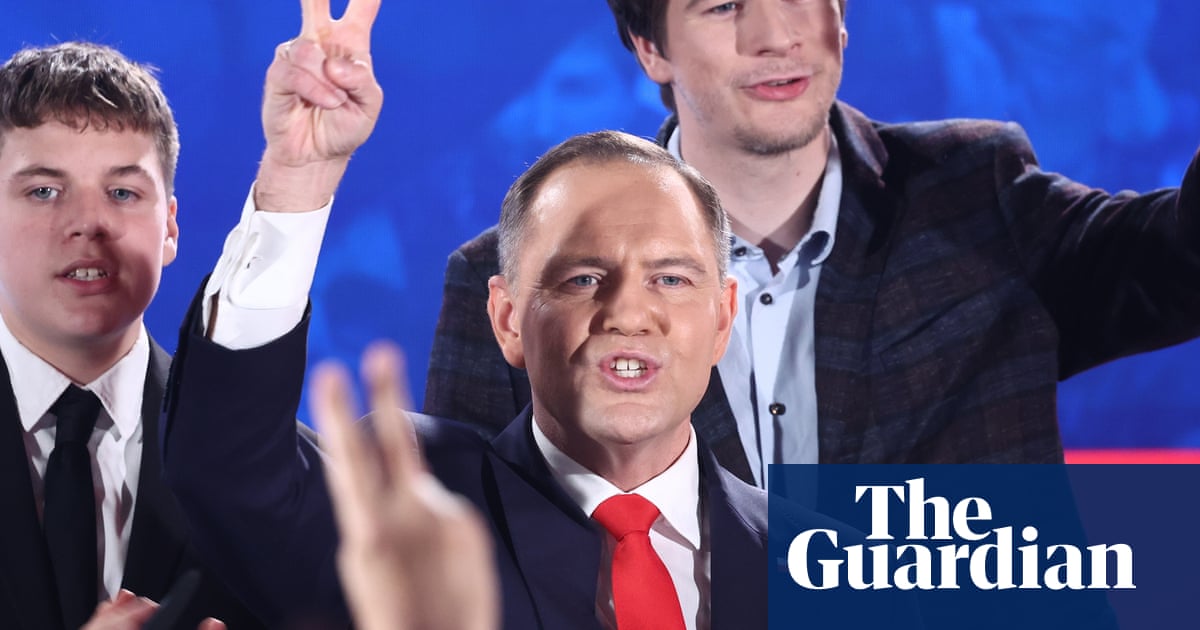Far-right leaders in Europe have welcomed the victory of the nationalist opposition candidate, Karol Nawrocki, in Poland’s presidential elections, a result that deals a huge blow to the centre-right prime minister Donald Tusk’s reform and pro-EU agenda.
Nawrocki, a conservative historian and former amateur boxer,won Sunday’s election with 50.89% of the vote, final figures showed on Monday, ahead of his rival, Rafał Trzaskowski, the liberal Warsaw mayor and an ally of Tusk, who secured 49.11%.
“Congratulations to President @NawrockiKn on his fantastic victory,” Hungary’s illiberal prime minister, Viktor Orbán,postedon social media, adding that he was “looking forward to working” with the 42-year-old, who has never held elected office.
France’s far-right National Rally leader,Marine Le Pen, said Nawrocki’s win was “good news” and marked a “disavowal of the Brussels oligarchy” trying to impose its “authoritarian policies and federalist ambitions … in defiance of the democratic will”.
Nawrocki was backed by the right-populist Law and Justice (PiS) party, which ruled Poland untilTusk’s parliamentary election victory in late 2023.
While the presidential role is largely ceremonial, it has some influence over foreign and defence policy, as well as the critical power to veto new laws. This can only be overturned with a 60% majority in parliament, which Tusk’s coalition does not have.
Nawrocki’s veto means it will be hard for the prime minister to pass big changes before the next elections in 2027.
Nawrocki’s win was a reversal of early exit polls, which suggested that Trzaskowski would edge the contest by less than a percentage point. Both candidates subsequently claimed victory, with Nawrocki’s win officially confirmed at about 8am on Monday.
Trzaskowski later conceded, congratulating Nawrocki on a victory “that comes with great responsibility, especially in such challenging times”. He thanked his supporters for voting for a “strong, safe, honest and empathetic”Poland.
During a bitterly fought and often bad-tempered campaign in recent weeks, the two men offered very different visions of Poland, and the result will have enormous implications for the country’s political future and for its role inEurope.
Trzaskowski, a pro-EU progressive, backed abortion law liberalisation and civil partnerships for LGBTQ+ couples. Nawrocki, who espouses conservative Catholic values, would probably veto any government attempt to implement such moves.
He is fiercely critical of the EU and likely to ally himself wherever he can with other nationalist, Eurosceptic leaders such as Orbán, fuelling divisions within the bloc at a time when it faces major challenges, including US tariffs and the war in Ukraine.
Nawrocki replaces the outgoing president and PiS ally, Andrzej Duda. Tusk’s time as prime minister has been marked by difficulties bringing his broad coalition into line, a situation made harder by having an ideologically opposed president in office.
Nawrocki’s win will probably prolong deadlock, turning’s Tusk’s government into “a lame-duck administration for the next couple of years”, said Prof Aleks Szczerbiak, an expert on east and central European politics at the University of Sussex.
“And it will be worse than with Duda, as Nawrocki will come in with a new mandate from what effectively turned into a referendum on the government,” he added It will also boost PiS, which clashed heavily with Brussels over the rule of law when in power.
Sign up toHeadlines Europe
A digest of the morning's main headlines from the Europe edition emailed direct to you every week day
after newsletter promotion
A senior PiS lawmaker, Przemysław Czarnek, suggested his party could soon start trying to pick off members of Tusk’s broad and already fractured coalition, with the eventual aim of creating a new rightwing majority in parliament.
“I can reassure you that maybe not starting tomorrow, but from Tuesday, we will begin very energetic work in order to give the Polish people another gift – the end of Tusk’s government,” Czarnek said.
Borys Budka, an MEP from Tusk’s Civic Platform, said he believed PiS would now seek to “overthrow the legal government”. He said this would be “a big challenge for the government, which will be blocked when it comes to good initiatives”.
Nawrocki has headed the Institute of National Remembrance, a state research body often accused of pushing a politicised version of history, since 2021.
Trzaskowski, the Oxford-educated mayor of Warsaw since 2018, previously held ministerial posts and served in the European parliament. He sought to project himself as a safe pair of hands to work with the government on progressive reforms.
Nawrocki’s campaign was openly backed by the US president Donald Trump’s Maga movement and his victory means “Trump will have more to say in Polish politics”, said Krzysztof Izdebski, the policy director at the Stefan Batory Foundation thinktank.
EU leaders put a brave face on the result, which came two weeks after Romania’s presidential electionwas won by the centrist mayor of Bucharest, Nicuşor Dan, in a setback for the continent’s nationalist forces.
The European Commission president, Ursula von der Leyen, said on Monday she was convinced the EU could continue its “very good cooperation” with Poland, while Germany’s president, Frank-Walter Steinmeier, sent “warm congratulations”.
Steinmeier offered close cooperation “on the foundation of democracy and the rule of law”, in order “to ensure a future for Europe in security, freedom and prosperity”, adding: “A strong Europe needs good German-Polish cooperation.”
But the result is likely to weaken Poland’s newfound position at the heart of EU mainstream decision making and could boost the Czech Republic’s Eurosceptic opposition leader, Andrej Babiš, before elections in October.
